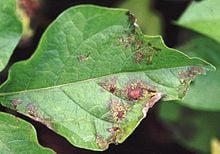 Plant pathogens like the one that led to the notorious Irish Potato Famine of the 1840's are still the subject of intense research at institutions like the University of California Riverside, as the battle continues between mega-crop farmers and diseases that have learned to infiltrate the plant’s immune system. Just what the genetic mechanism is that allows for that infiltration has remained elusive until recently. Studying the notorious oomycete pathogen Phytophthora in its multiple forms, UC Riverside researchers have identified a crucial step in the disease attack of the cell, namely the activity of virulence proteins in blocking RNA silencing pathways, which leads to immune system compromise. The role of RNA silencing as an important immune component is a new research direction and one that is being pioneered at UCR.
Plant pathogens like the one that led to the notorious Irish Potato Famine of the 1840's are still the subject of intense research at institutions like the University of California Riverside, as the battle continues between mega-crop farmers and diseases that have learned to infiltrate the plant’s immune system. Just what the genetic mechanism is that allows for that infiltration has remained elusive until recently. Studying the notorious oomycete pathogen Phytophthora in its multiple forms, UC Riverside researchers have identified a crucial step in the disease attack of the cell, namely the activity of virulence proteins in blocking RNA silencing pathways, which leads to immune system compromise. The role of RNA silencing as an important immune component is a new research direction and one that is being pioneered at UCR.
Tags: 2014, CA, 2013, University of California Riverside, genome research, Southwest, California, University of California, Plant science, BioResearch Product Faire Event, Funding, Riverside, NSF, Southwest Region, UCR
Missouri has a rich market of potential buyers of lab supplies and biotechnology products, according to recent NSF and NIH research funding statistics for Washington University in St. Louis. In 2012, the NSF awarded the university $14.4 million in research funding. The NSF-funded projects are located within a number of programs in the life sciences, including evolutionary processes clusters, molecular biophysics, cellular dynamics and function, neural systems clusters, behavioral systems clusters, macrosystem biology and bioinformatics. We have spotlighted the top five-funded projects below:
Tags: 2014, Midwest, 2013, Washington University, Missouri, WashU, WUSTL, BioResearch Product Faire Event, Research Funding, NIH, science researchers, MO, St Louis, NSF, lab supplier, funded
In a recent press release, the Mayo Clinic revealed its goal of making its Rochester, Minnesota campus a destination medical center. The Mayo Clinic will invest over $3 billion of healthcare funding in Minnesota, making this not only the state’s largest economic development plan, but one of the largest in the country. An additional $2.1 billion in private investments will also fund the project, which includes investing $3.5 billion in the Mayo Clinic’s Rochester campus over the next twenty years.
Tags: 2014, Midwest, 2013, Minnesota, Rochester, Mayo Clinic, BioResearch Product Faire Event, Funding, MN, lab supplier, RMN, healthcare funding
 Long considered one of the inferior senses, anyone who has lost their ability to taste as a result of age or cancer treatment will tell you life's luster is considerably dimmed in the absence of this sensory experience. Fortunately, research into taste and smell is going strong in Philadelphia at the Monell Chemical Senses Center, which is the only non-profit scientific basic research institute in the world dedicated entirely to understanding these intertwined senses. Once an entity within the University of Pennsylvania, the Center branched out on its own several decades ago, with labs a few blocks from the Penn campus on Market Street. Researchers at Monell work interdisciplinarily and many have joint appointments with Penn. Other research projects are carried out in conjunction with scientists at Thomas Jefferson University, also in Philly, and indeed with university and private lab investigators around the world.
Long considered one of the inferior senses, anyone who has lost their ability to taste as a result of age or cancer treatment will tell you life's luster is considerably dimmed in the absence of this sensory experience. Fortunately, research into taste and smell is going strong in Philadelphia at the Monell Chemical Senses Center, which is the only non-profit scientific basic research institute in the world dedicated entirely to understanding these intertwined senses. Once an entity within the University of Pennsylvania, the Center branched out on its own several decades ago, with labs a few blocks from the Penn campus on Market Street. Researchers at Monell work interdisciplinarily and many have joint appointments with Penn. Other research projects are carried out in conjunction with scientists at Thomas Jefferson University, also in Philly, and indeed with university and private lab investigators around the world.
Tags: 2014, 2013, Pennsylvania, Northeast, University of Pennsylvania, UPenn, Thomas Jefferson University, Stem cell research, taste buds, Monell Chemical Senses Center, Philadelphia, BioResearch Product Faire Event, PA, ThomJeff, taste
In the interest of keeping at the forefront of modern bioresearch, the University of Illinois Chicago has just announced the construction of a cell regeneration research center at its College of Medicine at Rockford. If the topic of cell regeneration sounds familiar, recall that the Mayo Clinic in Rochester is also a pioneer in regenerative medicine. (You can read our blog on the subject here.) The motivation for the center began with a three million dollar grant from the CWB foundation, which supports projects that benefit disabled people. Thanks to this grant and matching university funds, UIC will be able to join the biotechnology leaders who are performing research in this quickly growing field.
Tags: 2014, Midwest, 2013, University of Illinois, Illinois, BioResearch Product Faire Event, Chicago, IL, UIChgo
Tags: 2014, CA, University of California San Diego, 2013, Southwest, California, University of California, Autism, Neuroscience, San Diego, SDVS, UCSD, UC San Diego, Research, La Jolla, Biotechnology Vendor Showcase, Southwest Region
Algae research is a well-funded subject for science researchers, especially at Ohio State University. According to The Columbus Dispatch, Ohio State University has received $8.7 million in federal funding for algae-related projects. The U.S. Department of Energy gave $7 million to researchers interested in using waste water to grow algae biofuels, while the National Science Foundation gave $1.5 million for a project concerned with discovering the environmental impact of hazardous algae on Lake Erie. The project researchers are specifically interested in algae’s effects on climate change. Ohio State University researchers also received $150,000 from the Ohio Sea Grant Program to study the liver toxin concentrations on Lake Erie due to blue-green algae.
Tags: 2014, Midwest, 2013, Ohio State University, BioResearch Product Faire Event, Research Funding, NIH, science researchers, Columbus, OH, NSF, lab suppliers, OhStu, Algea
The Knight Cancer Institute at Oregon Health & Science University (OHSU) in Portland has just announced an important partnership with San Diego-based bioprinting technology company Organovo. Research into the biology of cancer, especially how it metastasizes, has been complicated in the past by the limitations of animal models and cell cultures, which really don't tell us enough about the workings of cancer within a human being. Organovo creates living, 3-D human tissue using their bioprinting device, the NovoGen MMX (below). The partnership between OHSU and Organovo will allow cancer research at Knight Institute labs to much more closely model the complex architecture of malignancy within the human body, using in vitro tissue. Ultimately this will lead to the development of more accurate therapeutics and pre-clinical trials.
Tags: 2014, 2013, Oregon Health Sciences University, Oregon Health and Science University, Northwest, cancer research, Oregon, Cancer Treatment, bioprinting, BioResearch Product Faire Event, Funding, Front Line event, OR, OHSU, Portland, Northwest Region
The University of Michigan at Ann Arbor is one of the most richly funded markets in the country for biotechnology vendors and lab suppliers, as recent NIH and NSF research funding statistics show. In 2012, the NIH gave the University of Michigan $456.3 million in research funding. The money has been awarded to various departments for research projects including:
Tags: University of Michigan, 2014, Midwest, 2013, Michigan, Ann Arbor, BioResearch Product Faire Event, Research Funding, Biotechnology, MI, lab supplies, NIH, UMich, NSF, U-M
“It’s pulsing; it’s beating! Now THAT is cool.”
Tags: 2014, Midwest, 2013, Regenerative Medicine, Minnesota, Rochester, Mayo Clinic, BioResearch Product Faire Event, Funding, MN, lab supplier, RMN

